
Only when things come to a breaking point do we really get serious about change. Covid-19 brought the global health care industry together in a truly remarkable, historic collaboration for vaccine development. Voilà. World-record, warp-speed solutions.
We must replicate this extraordinary achievement in science and collaboration to innovate around some of health care’s greatest challenges. With this same energy and determination, we could solve health disparities, reverse chronic conditions, break down health care affordability barriers—and perhaps even cure “incurable” diseases.
Meaningful action is long overdue. The U.S. spends more on health care than any other country, and yet we have the lowest life expectancy and the highest chronic disease burden. Health care should no longer function as, what Warren Buffet calls, the “hungry tapeworm of the American economy”—a parasitic system designed to profit off of our illness and declining health.
The health insurance industry is the lynchpin because it’s the node where all health care data arrives. It has enormous potential to turn people’s health dollars into more health and change the trajectory of disease in America. After all, insurers are the ones that have access to the data that can tell people what treatments and providers have the best outcomes and fairest prices.
The rise in health care consumerism shows people are ready and willing to engage. So, what would it take for health insurance to give consumers more information and more choices about how to find better care at the best price? What would that health plan look like?
Consumer prices based on value. Higher-value care should cost less and lower-value care should cost more. If insurers set and share prices in this way, consumers would be able to compare prices and shop for health care based on quality—leading to more effective, efficient outcomes. That would take a huge bite out of the 30-40% of spending in health care that’s wasteful. The goal is within reach because insurers already have the quality data to establish value and the power to set prices for consumers.
Personalized plan design to target health inequities. There’s a lot of talk about the equity problem in health care, but not enough significant action in the industry. Traditional health plan design has limitations because it assumes everybody has equal health needs. In reality, health needs vary from person to person. So, what if health insurance subsidization was personalized based on income level, known disparities, social determinants of health (SDOH) and clinical effectiveness of care? This would mean lowering the cost of and improving access to treatments and medications known to be particularly effective in treating certain conditions within at-risk populations. This alone would be a game-changer and make a significantly positive impact.
Clarity around what is and isn’t covered to improve overall health literacy. Health insurance is infamously difficult to understand. In fact, about one in four Americans have avoided care because they don’t know what their health insurance plan covers. Health insurance companies need to demystify coverage and help consumers understand what’s covered and not, with simple yes and no answers.
Leverage consumer buying power. We can harness collective consumer buying power to advocate for high-quality care at a lower cost. If consumers buy higher-quality health care more often, it rewards the providers who deliver the highest-quality care. If consumers’ voices get louder (via their pocketbooks), providers will be increasingly motivated to improve value and lower costs.
If all insurers adopt a consumer-first mentality, health care—a basic human need and right—can be affordable and accessible to everyone. If that sounds like a fantasy, it’s not. This is within reach.
If our mission is truly to improve health, we owe it to consumers, to ourselves and to our future to leverage the power of health insurance to improve the future of health. It’s time for some of that voilà we know we have in us.








